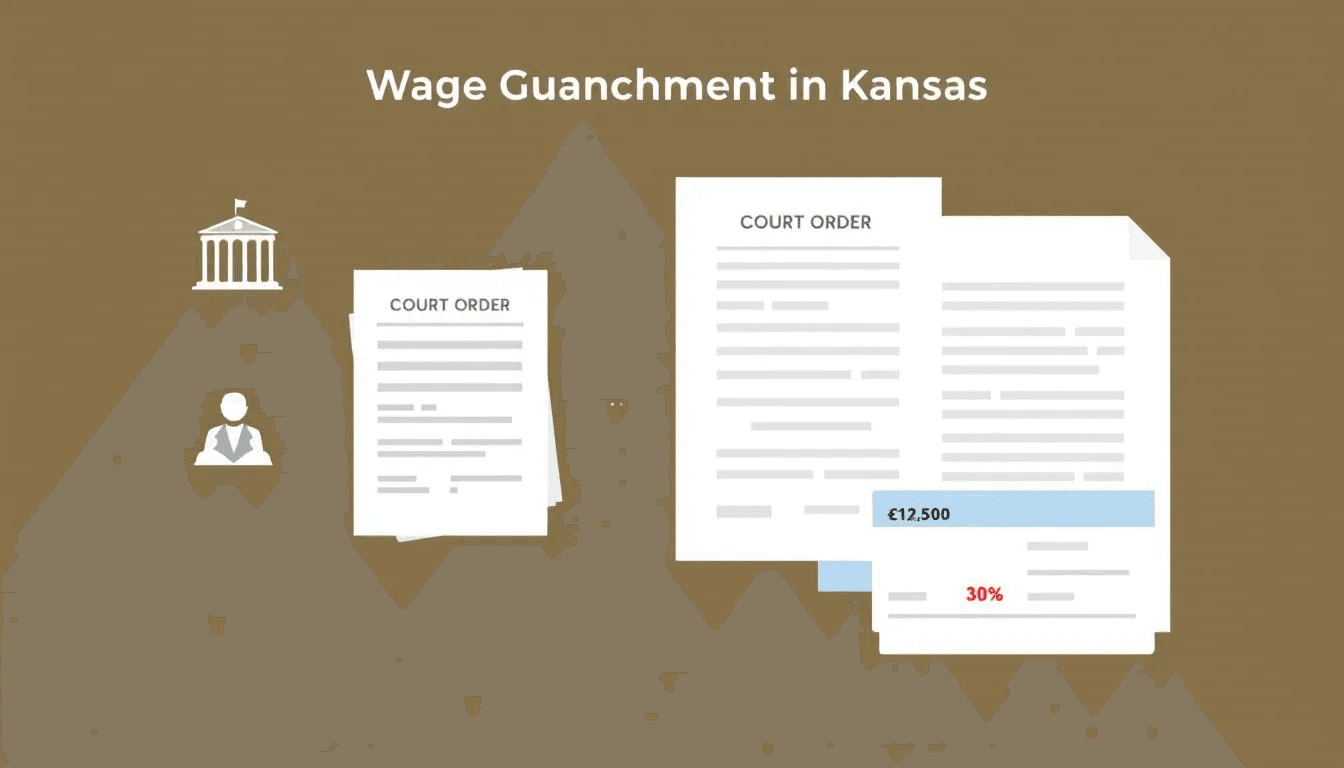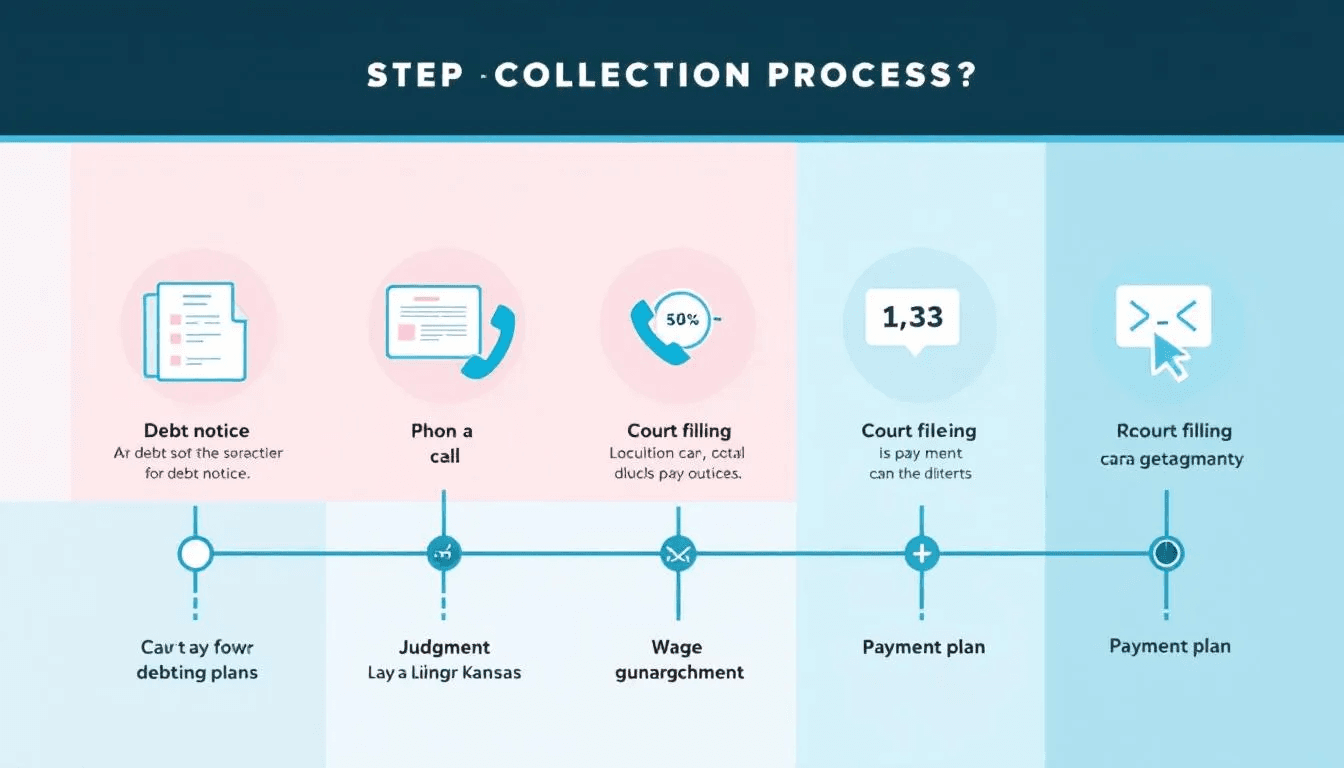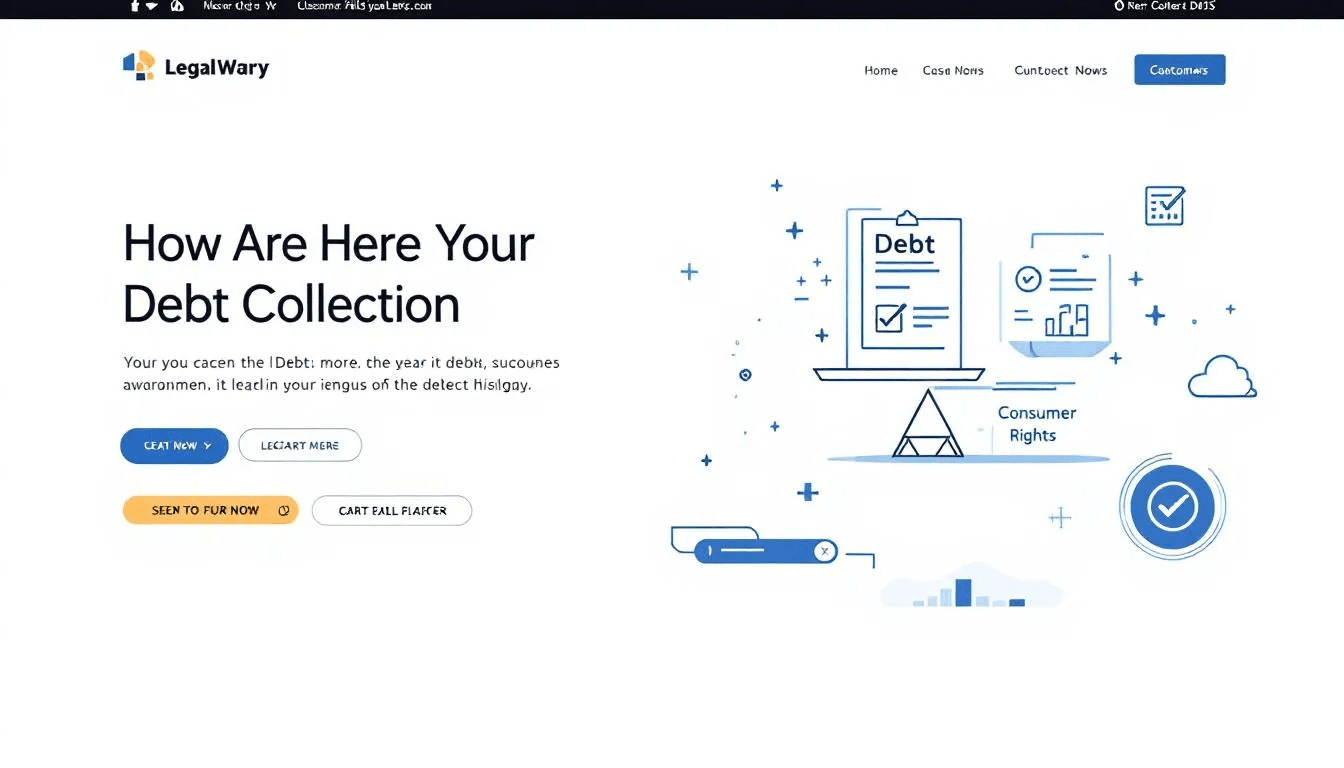If you’re dealing with debt in Kansas, understanding Kansas debt collection laws is essential. These laws protect you from unfair practices and outline what debt collectors can and cannot do. This article will cover your rights under the Kansas Consumer Protection Act, key regulations for debt collectors, and what to expect if you face debt collection.
Key Takeaways
- Kansas debt collection laws provide essential protections for both consumers and creditors, regulated by the Kansas Consumer Protection Act (KCPA) and the Fair Debt Collection Practices Act (FDCPA).
- The KCPA enables consumers to file complaints against debt collectors and ensures legal recourse for deceptive practices, while the FDCPA imposes strict communication and conduct standards on debt collectors.
- Understanding the statute of limitations for different types of debt and the legal implications of wage garnishment is crucial for Kansas residents to effectively manage their debts and protect their rights.
Overview of Kansas Debt Collection Laws


Kansas debt collection laws play a vital role in ensuring fair treatment of both creditors and debtors. Governed by a combination of state statutes and federal regulations, these laws aim to protect Kansas residents from unfair and deceptive practices. The Kansas Consumer Protection Act (KCPA) is a cornerstone of these protections, extending its reach beyond merchandise to include services and real estate transactions. This comprehensive approach ensures that consumers receive broad protection in various aspects of their financial dealings, in accordance with Kansas laws.
Credit reporting agencies like:
- Equifax
- Experian
- Transunion compile credit history reports that significantly influence a person’s creditworthiness. A good credit score can open doors to favorable loan terms, while a poor score can lead to higher interest rates or even loan denials. Therefore, maintaining a healthy credit score is essential for Kansas residents.
Additionally, organizations like Housing & Credit Counseling Inc. offer in-person assistance to persons owed consumers struggling with debt and loans, providing valuable support and guidance.
The KCPA also includes provisions that address warranty disclaimers and the right to cancel certain sales, further enhancing consumer protection and amendments thereto. By understanding these laws, both creditors and debtors can navigate the debt collection process more effectively, ensuring compliance and protecting their rights.
Legal Protections Under the Kansas Consumer Protection Act (KCPA)
The Kansas Consumer Protection Act (KCPA) offers extensive protections to consumers against deceptive business practices. Governed by both state and federal law, it goes beyond the Fair Debt Collection Practices Act (FDCPA) to provide additional safeguards. A key aim is to prevent businesses from engaging in unfair or deceptive collection practices, thereby protecting consumer rights.
Under the KCPA, debt collection agencies classified as ‘suppliers’ must adhere to stringent regulations to avoid deceptive practices, including prohibiting abusive language, threats of violence, or misrepresentation as government officials or attorneys. These measures ensure Kansas residents are treated with respect and fairness during the debt collection process.
The KCPA provides both public enforcement by the attorney general and private remedies for consumers affected by violations. This dual approach ensures violations are addressed promptly and effectively, offering legal recourse to those harmed by unfair practices. These protections help consumers navigate the legal process and safeguard their rights.
Fair Debt Collection Practices Act (FDCPA) Compliance in Kansas
The Fair Debt Collection Practices Act (FDCPA) is a federal law targeting third-party debt collectors to ensure they adhere to fair debt collection practices. In Kansas, these regulations are strictly enforced to protect consumers from misleading or oppressive tactics. Debt collectors must identify themselves and inform consumers of their purpose when initiating contact.
A critical aspect of the FDCPA is the restriction on contacted consumers at unreasonable times, such as before 8 AM or after 9 PM, unless the consumer has given explicit consent. This ensures debt collection efforts do not become intrusive or disruptive. Additionally, debt collectors are prohibited from:
- Using harassment tactics
- Making threats
- Using obscene language
- Making excessive calls to debtors
Consumers in Kansas have the following rights regarding debt collection:
- The right to dispute debts and request written verification within 30 days of initial contact from a collector.
- During this 30-day period, collection efforts must be paused until proper verification is provided.
- This provision ensures consumers have the opportunity to contest any inaccuracies and avoid wrongful debt collection.
Statute of Limitations on Debt Collection in Kansas
The statute of limitations for debt collection in Kansas varies depending on the type of debt:
- For oral contracts, the statute of limitations is three years.
- For written contracts, it is five years.
- For credit card and medical debt, the statute of limitations is five years, starting from the date of the last payment.
This means that creditors must initiate legal action within these time frames to recover their debts legally and pay their courts creditors.
Once the statute of limitations has expired, creditors cannot sue for the debt, although they may still attempt to collect it outside of court. However, if a debtor makes a payment or acknowledges the debt, the clock on the statute of limitations restarts. This can significantly impact the legal standing of debt collection efforts and should be carefully considered by both creditors and debtors.
Understanding these limitations helps Kansas residents manage their debts more effectively and ensures creditors adhere to the legal time frames for debt recovery. It underscores the importance of timely legal action in debt collection processes.
Wage Garnishment Laws in Kansas


Wage garnishment laws in Kansas are designed to balance the interests of creditors and debtors while ensuring fairness. Kansas law permits creditors to garnish up to 25% of an employee’s disposable earnings after mandatory deductions like taxes. Alternatively, the garnishment amount can be capped at 30 times the federal minimum wage, whichever is less.
Employers must comply with garnishment orders by withholding the specified maximum amount from the employee’s wages until the debt is fully satisfied. However, Kansas law limits creditors to one garnishment attempt per month for the same debtor. This restriction aims to prevent excessive garnishment actions that could unduly burden the debtor.
Judges in Kansas can make exceptions to the garnishment limits if it is shown that the garnishment is not intended to harass the debtor and there is evidence of non-exempt property. These laws help both creditors and debtors navigate the complexities of wage garnishment and ensure compliance with state judgment regulations.
Medical Debt Collection Regulations
Medical debt collection in Kansas is subject to specific regulations to protect patients’ privacy and ensure ethical practices. Compliance with the Health Insurance Portability and Accountability Act (HIPAA) is mandatory for medical debt collectors, which includes:
- Ensuring that patients’ private health information remains secure
- Securing all Protected Health Information through encryption
- Implementing strict role-based access controls
Debt collectors must adhere to these privacy regulations while engaging in medical debt collection, ensuring that sensitive information is not subject to improper disclosure. These measures provide additional protection for consumers dealing with medical debts, ensuring their rights are respected throughout the collection process.
Communication Rules for Debt Collectors
Effective communication is a cornerstone of fair debt collection practices, and Kansas law imposes strict rules on how debt collectors can interact with debtors. Collectors are prohibited from using threatening language or showing abusive behavior during communications with debtors. Additionally, they must not misrepresent themselves as attorneys or government officials.
Communication protocols must comply with both state and federal regulations, including respecting ‘cease communication’ requests from debtors. Adhering to these rules helps debt collectors maintain ethical standards and avoid legal repercussions, ensuring a respectful and fair debt collection process.
Steps in the Kansas Debt Collection Process


The debt collection process in Kansas typically starts with internal collection efforts, such as sending reminders and negotiating payment plans. If these initial attempts fail, the next step is often sending a formal demand letter, which is usually drafted by an attorney. This letter serves as a written notice and final notice before more serious legal actions are taken.
If internal efforts and demand letters do not yield results, creditors may hire collection agencies to pursue the debt. These agencies usually operate on a contingency basis, meaning they only get paid if they successfully collect the debt. When all prior steps fail, filing a civil action in court may be necessary to recover the debt.
Once a lawsuit is filed, the debtor must be served with a complaint and summons, ensuring proper jurisdiction. If a debtor requests debt validation during this process, agencies must provide proof and halt collection efforts until proper documentation is provided. These steps help both creditors and debtors navigate the debt collection process more effectively.
Penalties for Non-Compliance
Non-compliance with debt collection laws in Kansas can lead to significant penalties. Key points include:
- If a provision regarding collection costs is violated, it becomes unenforceable, leading to legal consequences for the debt collector.
- The costs associated with debt collection cannot include salaried employee fees.
- Attorney and collection agency fees are also excluded from collection costs.
- Collection costs cannot exceed 15% of the unpaid debt after default, which highlights the importance of understanding the cost of debt collection.
These restrictions ensure debt collection practices remain fair and transparent, protecting consumers from excessive or unfair charges. Understanding these penalties helps debt collectors avoid legal pitfalls and maintain compliance with Kansas debt collection laws.
Best Practices for Debt Collection Agencies


Debt collection agencies in Kansas should adhere to best practices to ensure compliance with fair debt collection practices and maintain consumer trust. Comprehensive documentation of every interaction and transaction is crucial to safeguard against disputes and audits. This practice not only ensures legal compliance but also enhances the agency’s reputation.
Implementing ethical practices is essential for operating legally and ethically. Consumers in Kansas can file complaints with the Attorney General’s Office or the if they experience violations of debt collection laws. Following best practices helps agencies avoid legal issues and build a positive relationship with consumers.
Key Takeaways for Consumers and Creditors


Understanding Kansas debt collection laws is crucial for both creditors and consumers to ensure compliance and protect their rights. For consumers, violations of these laws can result in damages and penalties between $100 and $1,000, providing a financial remedy for unfair practices. Additionally, if a creditor incorrectly charges a consumer, they may be liable for twice the excess amount paid by the consumer.
Legal fees incurred by consumers in successful actions against creditors for violations may be awarded by the court, further protecting consumer rights. However, creditors can avoid penalties if they correct an error within 15 days of discovering it. Understanding these key points helps both parties navigate the debt collection landscape more effectively, including the potential for attorneys fees and court costs.
Summary
In conclusion, understanding Kansas debt collection laws is crucial for both consumers and creditors. These laws ensure fair debt collection practices, protect consumer rights, and provide legal remedies for violations. By staying informed and adhering to these regulations, both parties can navigate the debt collection process more effectively and with greater confidence.
Frequently Asked Questions
How much debt do you have to be in to go to jail?
You cannot be jailed simply for owing money, as debtors’ prisons were abolished in the U.S. in 1833. Unpaid consumer debts will not lead to incarceration.
What is the statute of limitations for debt collection in Kansas?
The statute of limitations for debt collection in Kansas is three years for oral contracts and five years for written contracts. It is essential to be aware of these timeframes when dealing with debt-related issues.
Can debt collectors contact me at any time of the day?
Debt collectors cannot contact you before 8 AM or after 9 PM unless you have provided explicit consent. It is important to be aware of your rights regarding debt collection practices.
What can I do if I believe a debt collector is violating my rights?
If you believe a debt collector is violating your rights, you should file a complaint with the Attorney General’s Office or the . Taking these steps can help protect your rights and hold the collector accountable.
How much of my wages can be garnished in Kansas?
In Kansas, up to 25% of your disposable income can be garnished, or 30 times the federal minimum wage, whichever amount is lesser.

